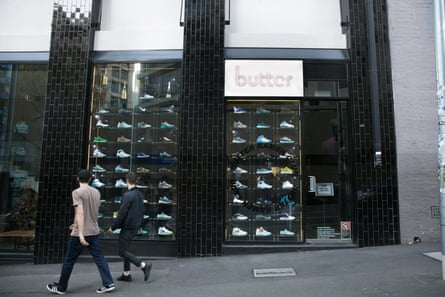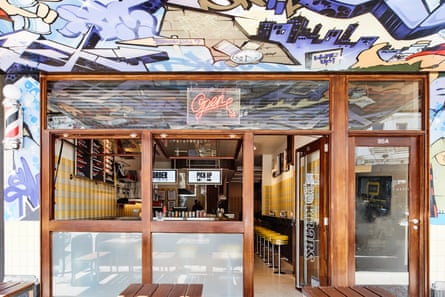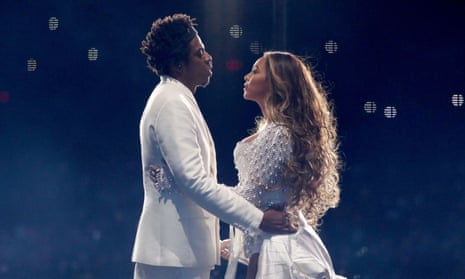Pop into one of the many trendy burger joints that dot Australia’s inner cities and chances are you’ll find one of the following: an oversized mural of an American rapper; a colourful graffiti homage to hip-hop slang; speakers churning out tunes by Biggie Smalls, 2Pac or Snoop Dogg; and a menu item called a “Cheezy Yeezy” (after Kanye West) or “The Ghostface” (Ghostface Killah).
Over the past few years, hip-hop themed eateries seem to have popped up everywhere. The food focuses largely on burgers and fried chicken, like at Milky Lane and 4 Ounces, but the trend has started moving into other cuisines too.
There’s Biggie Smalls Kebabs in Collingwood, “strictly over-18s” Italian restaurant Big Poppas in Sydney, and special events like the “90s Throwback Vegan Hip-Hop High Tea” hosted by Belleville in May (perhaps the most Melbourne event in history). Butter in Sydney’s Surry Hills is a singular offering: a hybrid sneaker, fried chicken and champagne bar, with menu items including the Cheezus sandwich and the Grand Master Box, and a monthly online hip-hop feature called Butter & Beats.
The trend has picked up such momentum that satirical website The Betoota Advocate published a story about it: Trendy Inner-City Burger Joint Fined For Not Playing Enough Wu-Tang Clan. But when does a cute theme become cringeworthy? And is it ever culturally tone deaf?

A Nielsen report found that in 2017, hip-hop surpassed rock as the United States’ most popular genre for the first time; and in Australia, it’s occupying more mainstream spaces than ever. Kendrick Lamar topped the Hottest 100 and headlined Splendour in the Grass this year, and ASAP Rocky leads the Listen Out lineup this month. In January, Post Malone sold out stadiums across Australia, and a few months later, 16 of the 17 tracks on his Beerbongs & Bentleys album hit the Aria’s top 50 singles chart.
The trend in the Australian food world isn’t new (Perth’s grilled cheese establishment, Toastface Grillah, opened in 2013), but as the genre goes supersized, more restaurants are cashing in, with menus and murals that are bigger, bolder and – crucially – more Instagrammable.
Chady Khouzame, manager of Sydney venue The Carter, says the genre’s rise “created a market for people to find a venue to experience the culture of [US] hip-hop” in Australia. The restaurant/bar with Americanised decor is named after hip-hop’s premier power couple Jay-Z and Beyoncé, and the menu features dishes named after Nicki Minaj and Notorious BIG.
The theme, Khouzame says, was inspired by his own love for hip-hop. “Following a few business trips to the US, I felt like Sydney was missing out on a hip-hop vibe, and in particular, American-style comfort food.”

But it’s not for everyone – not even for all hip-hop fans. Mitch Orr is the head chef of Sydney’s award-winning ACME; he often plays hip-hop over the speakers, but that’s as far it goes.
“Opening a restaurant based on a trend is never a good idea,” he tells Guardian Australia. “These days, people feel like they need a hook to set their business apart. This used to be cooking unique food or offering great service, but in the Instagram age, the hook is what [photos] people will put on social media ... and the product being served takes a back seat.”
Besides, Orr says, the links between the food and hip-hop at some of these restaurants are “super fucking tenuous”. In Bondi, for instance, Kingfish Poke – “fresh eats, dope beats” – features a mural of late rapper 2Pac holding chopsticks, where his infamous “Thug Life” tattoo has been swapped out for the slogan “Fish Life”. There’s a chicken poke named after Kendrick Lamar, whose father worked at a KFC; and a tofu option named after Jay-Z, who has dabbled in veganism.
Orr says in some instances, sloppily mashed-together themes can distract from the actual food. “If you have a good product – be it vegan, poke or burgers – have that as your selling point. If your product is shit, adding the words ‘hip-hop’ to your restaurant model is not the way to solve your problems … As a person that loves rap, it’s extremely cringeworthy at the least, leaning to offensive.”
This article includes content provided by Facebook. We ask for your permission before anything is loaded, as they may be using cookies and other technologies. To view this content, click 'Allow and continue'.
In 2016, Melbourne restaurant FAT Fried and Tasty came under fire for placing a large image of Biggie Smalls holding a photoshopped chicken drumstick in their restaurant, alongside images of white families holding guns and slogans like “Chicken Over Bitches”. Considering Smalls was shot to death in 1997, long-standing stereotypes tying black Americans to fried chicken, and America’s long history of gun violence, it’s not hard to see why many found the decor to be distasteful.
(Since then, the owners of FAT Fried and Tasty have replaced some of the images – but the Biggie Smalls poster still stands.)
In January, Milky Lane opened a new branch of their hip-hop restaurant, describing the interior as having an “upmarket street and ghetto feel”. With the eatery sitting in the sun-soaked beachside suburb of Cronulla, the oxymoronic wording struck a nerve with Hau Latukefu, host of the weekly Triple J hip-hop show. In his own Instagram post, he called out Milky Lane for “casual racism and cultural appropriation at its finest”, sparking a fiery comments section.
“The problem lies in their ignorance. If you know anyone that lives in or is from the ghetto, they will tell you it’s not a choice for them to reside there,” Latukefu tells the Guardian. “The ghetto is not something a Cronulla business can use to describe their super cool and chic establishment. You’re not going to try and describe your swish place of business as ‘houso chic’, are you?”. (Milky Lane has told the Guardian the copy was “incorrect wording” from someone who was not in a position to have been speaking on behalf of the restaurant.)
This article includes content provided by Instagram. We ask for your permission before anything is loaded, as they may be using cookies and other technologies. To view this content, click 'Allow and continue'.
Perhaps more than any other subculture, hip-hop holds authenticity close to its heart, so businesses who use it as a cheap marketing gimmick are bound to face some backlash.
“I feel that you can tell when someone is being genuine about their love and appreciation for the music and the culture, and when someone is just using them because it’s on trend,” Latukefu says. “If you truly are about it, it will come through. Give me a Master P cheeseburger or a KRS-One pizza, and I’m there.”
